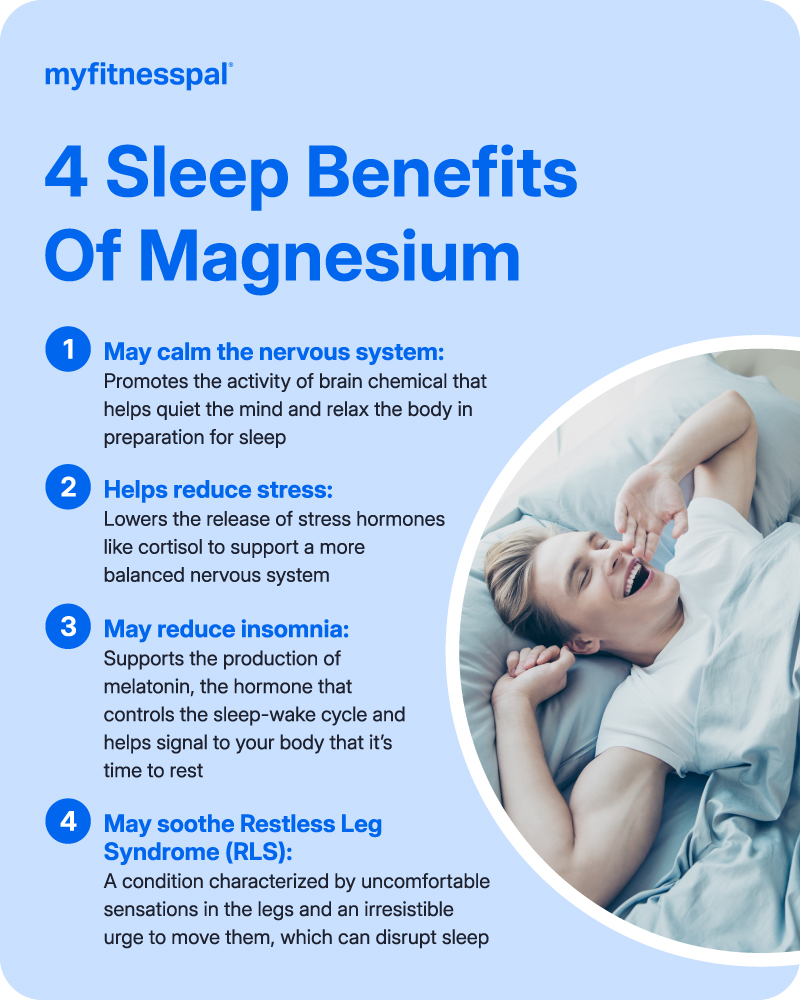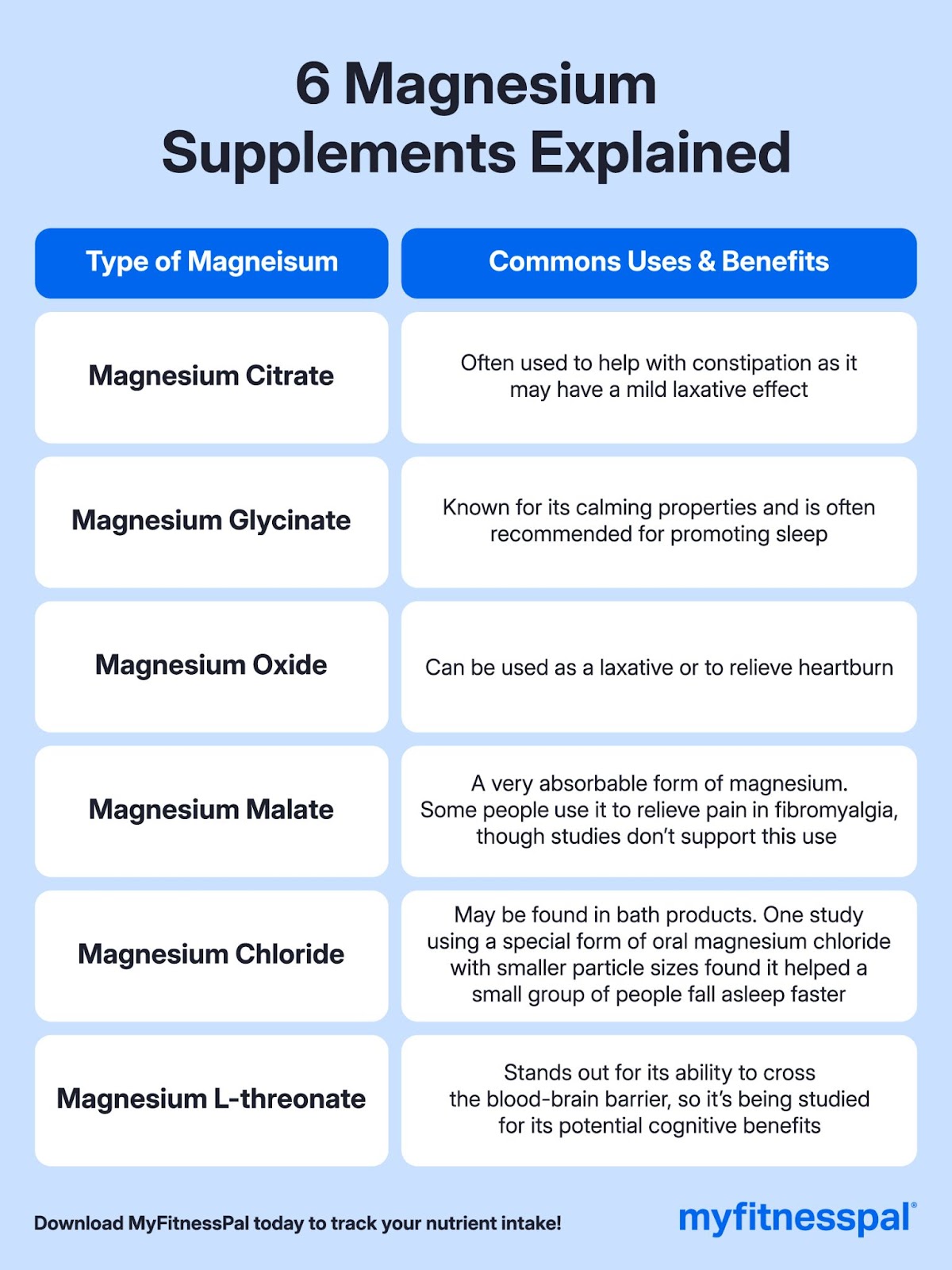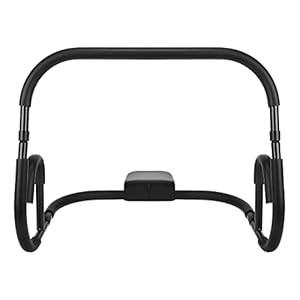
In case you’ve ever spent the evening staring on the ceiling, you know the way anxious insomnia may be. It makes it tougher to get by the day, not to mention follow your well being targets. Certain, a cup of espresso would possibly get you going, however there may be one other technique that may assist.
Magnesium, typically referred to as the “rest mineral,” performs a job in calming your nervous system and serving to you unwind.
Almost half of Individuals don’t get sufficient of this important nutrient, leaving them in danger for sleepless nights (3). In case you’re on the lookout for higher slumber, magnesium would possibly simply be the lacking piece to your sleep puzzle.
Magnesium is an important mineral concerned in over 300 reactions within the physique (3). It performs a vital function in power manufacturing, nerve perform, and muscle well being. Past these normal advantages, magnesium is especially beneficial for selling restful sleep (1, 3, 5).
In line with Daisy Mercer, registered dietitian at MyFitnessPal, research present that roughly 48 % of individuals of all ages in the US devour lower than the beneficial quantity of magnesium day by day. And which will affect sleep (3). Let’s dive into the advantages of magnesium for sleep so you’ll be able to determine if it’s best for you.
How Magnesium Advantages Sleep
Magnesium is usually referred to as the “rest mineral” as a result of it performs a big function in calming the physique and thoughts (5).
Listed below are among the methods it really works to assist higher sleep:
Could calm the nervous system
Magnesium promotes the exercise of gamma-aminobutyric acid (GABA). That’s a mind chemical that helps quiet the thoughts and calm down the physique in preparation for sleep (5). Low ranges of GABA are linked to nervousness and sleep disturbances, so magnesium’s affect on this neurotransmitter could also be useful (6).
Moreover, magnesium helps cut back stress by regulating the physique’s stress-response system. It lowers the discharge of stress hormones like cortisol and helps a extra balanced nervous system (6).
By doing double obligation calming the mind and minimizing stress, magnesium can play a job in serving to you sleep (6).
Can cut back insomnia
Magnesium helps the manufacturing of melatonin, the hormone that controls the sleep-wake cycle. And melatonin helps sign to your physique that it’s time to relaxation (2).
When magnesium levels are low, melatonin production may be disrupted, potentially leading to difficulties falling or staying asleep (2).
In addition to its role in making melatonin, magnesium’s calming effects make it a potential tool for addressing insomnia. One analysis found that magnesium supplementation helped people fall asleep almost 20 minutes faster (5).
Another small study among adults with poor sleep quality found that a magnesium supplement resulted in improvements in sleep quality (7).

May Help Soothe Restless Leg Syndrome (RLS)
Some people find magnesium helpful for managing Restless Leg Syndrome (RLS). RLS is a condition characterized by uncomfortable sensations in the legs, which can disrupt sleep (2).
Some studies have found that magnesium may help alleviate symptoms, particularly when RLS is associated with magnesium deficiency (8). But MyFitnessPal registered dietitian Emily Sullivan says the evidence doesn’t support using magnesium for muscle cramps unless you’re deficient.
Magnesium might help with RLS when it’s combined with vitamin B6 (9). One study found that this combo helped improve RLS symptoms and sleep quality (9).
Types of Magnesium
There are several common types of magnesium supplements, each with different properties. Here are some of the more common forms.
- Magnesium citrate is often used to help with constipation as it may have a mild laxative effect (3).
- Magnesium glycinate is known for its calming properties and is often recommended for promoting sleep (10).
- Magnesium oxide can be used as a laxative or to relieve heartburn (3).
- Magnesium malate is considered a very absorbable form of magnesium. Some people use it to relieve pain in fibromyalgia, though studies don’t support this use (12, 13).
- Magnesium chloride may be found in bath products. One study using a special form of oral magnesium chloride found it helped a small group of people fall asleep faster (7).
- Magnesium L-threonate stands out for its ability to cross the blood-brain barrier, so it’s being studied for its potential cognitive benefits (14).
Best magnesium for sleep
Magnesium glycinate is a top choice for helping with sleep due to its ability to support relaxation and calm the nervous system (10). The combination of magnesium with glycine may make it particularly helpful for improving sleep quality and reducing insomnia (10).
While there aren’t head-to-head studies suggesting that magnesium glycinate is the best magnesium for sleep, I prefer it to other forms of magnesium because it’s well-tolerated and unlikely to cause gastrointestinal side effects (10).
Magnesium Dosage
The recommended dietary allowance (RDA) for magnesium varies by age and sex but ranges from 310–420 mg per day for adults (3).
For general health and sleep support, most experts suggests to supplement in the range of 200–400 mg per day (3). However, check with your doctor before taking more than 350 mg per day of magnesium (3).
Meanwhile, there’s no set time of the day to take magnesium for sleep. The benefits come with long-term use. You may want to start with a lower dose, especially if you’re new to magnesium supplements, to avoid potential digestive upset (1). Also, since magnesium and calcium compete for absorption, it’s best to avoid taking these two supplements together (1).
Food Sources that May Help With Sleep
A variety of nutrient-dense foods, including leafy greens, whole grains, nuts and seeds are packed with magnesium (3).
“Some good examples are chia seeds, pumpkin seeds, almonds, and spinach,” says Mercer. “These foods can be easily added into your routine to support adequate magnesium levels and, therefore, better sleep.”
Here are some other foods that provide a nice boost of magnesium (3):
- Tofu
- Oatmeal
- Potatoes
- Dark chocolate
So, sprinkle pumpkin seeds or almonds over your yogurt or have them as a standalone snack. Add some spinach to your morning smoothie to boost the magnesium content.
Including magnesium-rich foods in your diet can help you meet your daily magnesium quota, which may translate to sleep benefits (3). You can use MyFitnessPal to track your food intake and ensure you’re eating a variety of magnesium-boosting foods, like leafy greens and nuts, every day.
About the Experts
Samantha Cassetty, MS, RD, is a nationally recognized food and nutrition expert, media personality, nutrition consultant, and author. Cassetty is a former nutrition director for Good Housekeeping and the co-author of the book Sugar Shock.
Daisy Mercer, RD, is a Food Data Curator at MyFitnessPal. She graduated with her bachelors of Food Science and Dietetics from Colorado State University and completed her dietetic internship with the VA San Diego Healthcare system.
Emily Sullivan, RD is a food data curator at MyFitnessPal. She earned her bachelor’s degree and completed her dietetic internship at The Ohio State University, and obtained her culinary arts degree from Johnson and Wales University.
Magnesium Side Effects
While magnesium supplements are safe for most people, they can cause side effects, especially when taken in high doses (3).
The most common side effects include digestive issues such as diarrhea, nausea, or stomach cramps (3). These are often associated with certain types of magnesium, like magnesium citrate or magnesium oxide, which have laxative effects (3).
One time, I was at a business lunch, and the subject of magnesium came up. The person I was dining with shared that she started taking magnesium and couldn’t stomach it because of the side effects. After discussing it, I learned she was taking magnesium citrate, so I suggested switching to magnesium glycinate. She later let me know that this simple swap did the trick!
To minimize or avoid side effects, consider these tips:
- Begin with the smallest recommended dose and gradually increase if needed (3).
- Opt for forms like magnesium glycinate or magnesium malate, which are gentler on the gastrointestinal (GI) system (3).
- Stick with less than 350 mg per day unless otherwise advised by a healthcare provider (3).

You might also like
Other Ways to Improve Sleep
While magnesium may play a role in promoting sleep, pairing it with other natural strategies and lifestyle adjustments can be helpful (4).
Here are a few more ways to improve sleep:
- Stick to a consistent sleep schedule . Going to bed and waking up at the same time each day helps regulate your body’s internal clock, making it easier to fall asleep (4).
- Create a calming bedtime routine . Relaxing activities like reading, gentle stretches, and meditation can help signal to your brain that it’s time to wind down (4).
- Limit screen time before bed . The blue light emitted by devices can interfere with melatonin production (4). Try setting devices aside at least an hour before bed (4). (Longer is better.)
- Optimize your sleep environment . Keep your bedroom cool, dark, and quiet (4).
- Include melatonin-rich foods in your diet. Foods like tart cherries, kiwi, and walnuts, are natural sources of melatonin . Including these as part of a light bedtime snack may help promote sleepiness (15).
- Avoid sleep wreckers. Reduce caffeine and alcohol intake in the hours leading up to bedtime. Avoid a heavy dinner and late-night snacks to prevent indigestion during the night (4).
MyFitnessPal has a helpful sleep feature that connects to your Apple Watch or other sleep-tracking device. You can use it to get a snapshot of your sleep and eating habits to make better sleep-supporting choices.
When combined with these practices, magnesium supplementation can complement your efforts by supporting relaxation and reducing factors like muscle tension or stress that may interfere with sleep (10). Together, these approaches create a well-rounded strategy for better rest.
Frequently Asked Questions (FAQs)
Which kind of magnesium is best for sleep?
Magnesium glycinate is often recommended for sleep because of the calming effects of glycine and it’s easier on the GI system (10). However, other forms of magnesium have been studied and found to be helpful for sleep (7).
Is magnesium citrate or glycinate better for insomnia?
Many people prefer magnesium glycinate for insomnia since it’s gentler on your GI system, but some studies have found that magnesium citrate can help promote better sleep, too (10, 5).
Is it okay to take magnesium every night for sleep?
Yes, it’s generally safe to take magnesium nightly for sleep, but consult a healthcare provider for personalized advice (1).
The Bottom Line
Magnesium plays an important role in promoting sleep by calming the nervous system, supporting melatonin production, and potentially reducing symptoms of insomnia or Restless Leg Syndrome (10).
While you can take supplements to improve your sleep, you can also increase your magnesium intake through nutrient-rich foods like leafy greens, nuts, seeds, and dark chocolate (3).
The MyFitnessPal sleep feature integrates sleep data from your connected apps and provides insights that can help you notice patterns in your diet that might be impacting your sleep. Download the app now.
The post Does Magnesium Work for Sleep? appeared first on MyFitnessPal Blog.
Trending Products














